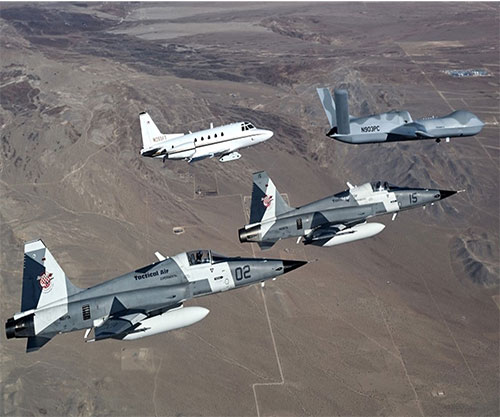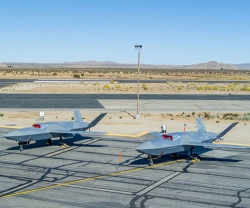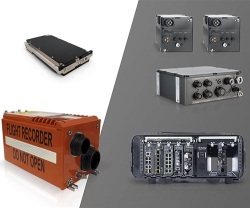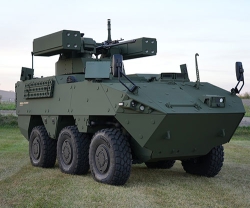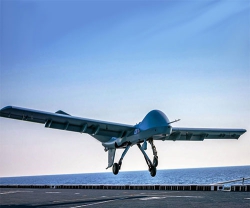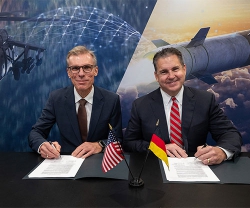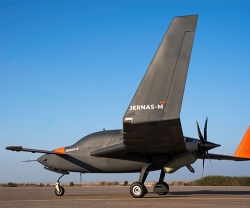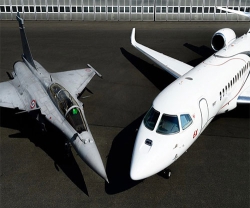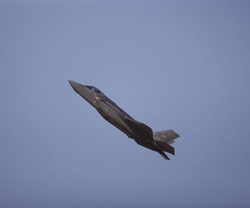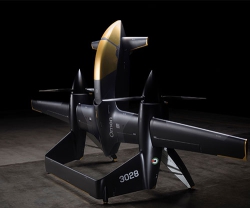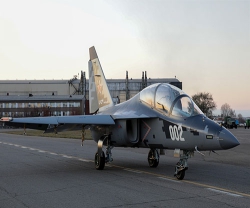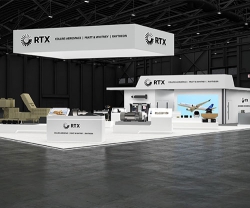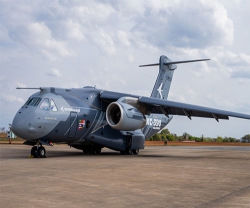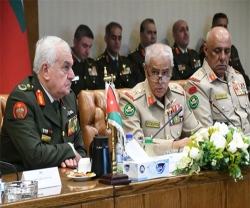On November 17, General Atomics Aeronautical Systems (GA-ASI) paired a company-owned MQ-20 Avenger® Unmanned Aircraft System (UAS) with a Sabreliner, operated by Lockheed Martin and acting as a surrogate fighter, and two F-5 Advanced Tigers (AT) from Tactical Air Support configured with internal TacIRST sensors, to perform multi-platform infrared sensing.
During this event, all aircraft performed coordinated maneuvers to sense relevant airborne targets in the infrared spectrum. The MQ-20 and Sabreliner were digitally connected over a Tactical Targeting Network Technology (TTNT) mesh network to share sensing observations. In addition to the live-flight aircraft, five digital twins of the MQ-20 were integrated to autonomously fly a Live, Virtual, Constructive (LVC) collaborative combat mission.
All live aircraft had operational next-generation Tactical Infrared Search and Track (TacIRST™) sensors during the test to provide Air-to-Air Moving Target Tracking. These live tracks were provided by Lockheed Martin’s TacIRST sensor and was processed on a General Dynamics Mission Systems’ EMC2 Multi-Function Processor (MFP), commonly referred to as “the Einstein Box.” Using this software-defined architecture, the flight demonstrated crewed and uncrewed teaming between the MQ-20s, Sabreliner and manned F-5 AT tactical fighters.
“This test flight has broken new ground for us,” said GA-ASI Senior Director of Advanced Programs Michael Atwood. “It demonstrated effective collaboration between four established defense prime contractors flying with advanced sensing, crewed and uncrewed teaming, and advanced airborne high-performance computing to meet challenging air dominance scenarios. This is a clear demonstration of our rapidly maturing Autonomous Collaborative Platform (ACP) mission system suite and moves us one step closer to providing this revolutionary capability to the warfighter.”
“Flying four platforms with TacIRST installed was a major milestone for Lockheed Martin,” stated Matthew Merluzzi, Sr. Program Manager at Lockheed Martin. “By leveraging open mission systems, our team has demonstrated that common platform integration is possible across a variety of vehicles bringing advanced capabilities to our warfighters quicker and more affordably.”
To accomplish the multi-company integration, the MQ-20 team used a government-furnished CODE autonomy engine and the government-standard Open Mission Systems (OMS) messaging protocol to enable communication between the autonomy core and TacIRST. In addition, GA-ASI used General Dynamics’ EMC2, an open architecture MFP with multi-level security infrastructure to run the autonomy architecture, demonstrating the ability to bring high-performance computing (HPC) resources to ACPs to perform quickly tailorable mission sets depending on the operational environment.
This is another in an ongoing series of autonomous flights performed using internal research and development (IRAD) funding to prove out important concepts for ACPs.
Headquartered in Bethesda, Maryland, Lockheed Martin Corporation (NYSE: LMT) is a global security and aerospace company that employs approximately 114,000 people worldwide and is principally engaged in the research, design, development, manufacture, integration and sustainment of advanced technology systems, products and services.
Tactical Air Support Inc. is a leader in commercial air services, tactical aviation training, and technical advisory services for the US Military and our International partners. Since its inception in 2005, Tactical Air has continuously applied innovative business practices to provide the government and aviation industry with unparalleled, yet affordable commercial air support and tactical consulting.
General Atomics Aeronautical Systems, Inc. (GA-ASI), an affiliate of General Atomics, is a leading designer and manufacturer of proven, reliable Remotely Piloted Aircraft (RPA) systems, radars, and electro-optic and related mission systems, including the Predator® RPA series and the Lynx® Multi-mode Radar.
With more than seven million flight hours, GA-ASI provides long-endurance, mission-capable aircraft with integrated sensor and data link systems required to deliver persistent flight that enables situational awareness and rapid strike. The company also produces a variety of ground control stations and sensor control/image analysis software, offers pilot training and support services, and develops meta-material antennas. (Photo courtesy Tactical Air Support)

